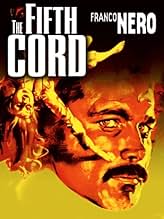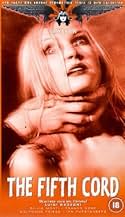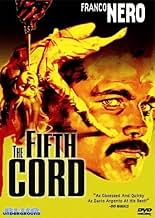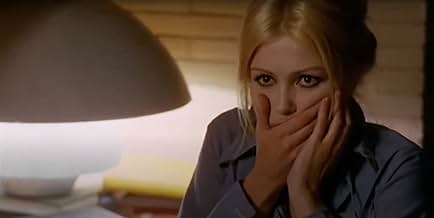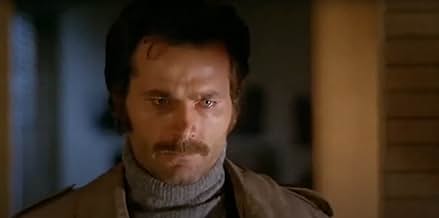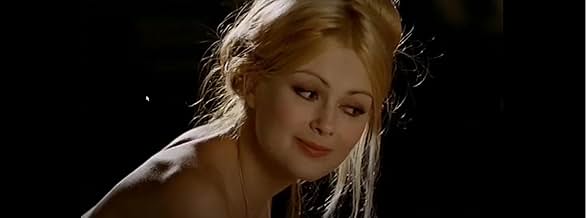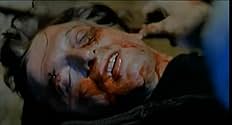CALIFICACIÓN DE IMDb
6.6/10
2.9 k
TU CALIFICACIÓN
Agrega una trama en tu idiomaA maverick, heavy-drinking journalist pursues a killer who is targeting acquaintances of his, prompting the police to brand him a suspect in their investigation.A maverick, heavy-drinking journalist pursues a killer who is targeting acquaintances of his, prompting the police to brand him a suspect in their investigation.A maverick, heavy-drinking journalist pursues a killer who is targeting acquaintances of his, prompting the police to brand him a suspect in their investigation.
- Dirección
- Guionistas
- Elenco
Ira von Fürstenberg
- Isabel Lancia
- (as Ira Fürstenberg)
Luciano Bartoli
- Walter Auer
- (as Luciano Baroli)
Luigi Antonio Guerra
- Man
- (as Guerra L. Antonio)
Michel Barnes
- Tony Volta
- (sin créditos)
Jean-Pierre Clarain
- Journalist in Bini's Home
- (sin créditos)
- …
Opiniones destacadas
Any fan of 1970s Italian Giallo films has seen enough of them to know what to look for, but, of course, everyone sees something different in art. We all know about The Cat o Nine Tails (cool as hell) and Deep Red (bloody amazing), but some lesser-known Gialli have been available for re-discovery courtesy of Blue Underground and Shreikshow labels.
One of the better ones has to be The Fifth Cord starring Franco Nero. For me, the number one thing in these films is not plot points but ATMOSPHERE. This film not only has the great Franco Nero as its protagonist, but is brilliantly shot by Vittorio Storaro. Also, the director knows what to show most of the time, and when and how to show it. The finale is set in one of those funky 1960s European open concept homes with the stairwell to the second floor in the middle of the living room and a huge fireplace fit for Cortina! The kind of films we don't see any more, unfortunately. Without these DVD releases, we'd be stuck with a lot of modern would-be thrillers involving cell-phones and teeny-boppers.
One of the better ones has to be The Fifth Cord starring Franco Nero. For me, the number one thing in these films is not plot points but ATMOSPHERE. This film not only has the great Franco Nero as its protagonist, but is brilliantly shot by Vittorio Storaro. Also, the director knows what to show most of the time, and when and how to show it. The finale is set in one of those funky 1960s European open concept homes with the stairwell to the second floor in the middle of the living room and a huge fireplace fit for Cortina! The kind of films we don't see any more, unfortunately. Without these DVD releases, we'd be stuck with a lot of modern would-be thrillers involving cell-phones and teeny-boppers.
"I am going to commit murder," whispers our killer, as the camera flits around the jaded revellers at a New Year shindig. "I can imagine the thrill and pleasure I will experience as I stalk my victim..." Shortly after, John Lubbock (Maurizio Bonuglia) survives an attack in an underpass on his way home, and journalist Andrea Bild (Franco Nero), a fellow attendee, decides to investigate. Then a second party goer - invalid Doctor's wife Sophia Bini (Rossella Falk) - is attacked and killed in her home, and Andrea's elderly editor is found dead in a local park, both bodies accompanied by the killer's calling card (a black glove with first one then subsequent fingers cut off). Suddenly, the outspoken, hard-drinking journalist finds himself rising swiftly up the list of suspects.
What raises The Fifth Cord above the average giallo is striking cinematography and a couple of genuinely suspense-filled murders. The sequence involving the Doctor's wife is the most characteristic of the genre. Taking place in a huge and intimidating bedroom it also evokes the Gothic feel of old Hollywood and the memory of a certain Mrs de Winter. Bazzoni expertly handles the build-up of tension, getting the unfortunate Mrs Bini out of bed and crawling along the floor in a rising panic as first her wheelchair then telephone (her lifeline) vanish into the shadows. There's an almost supernatural element at play here. When the familiar gloved hands suddenly appear either side of the screen to slowly descend from behind and wrap themselves around her throat, they seem almost disembodied.
In contrast, the rest of the film is a study in modernity. Everything is concrete and glass, clean lines and polished surfaces. Every shot is carefully and deliberately lensed and filled with geometric shapes and patterns. Edges and shadows converge to corral Nero as the finger points increasingly in his direction. A scene in which he meets with the investigating officer in a subterranean parking lot is particularly well done, where the frosted windows behind the actors are reflected in the roof of the car in front and join with the widescreen framing to form a cage. The ending comprises tough-guy fisticuffs and a pulse-quickening chase sequence through the cadaverous wreck of an abandoned factory where Nero finally unmasks the black-coated killer, having already deduced the real motive, which twists the opening voice-over in a new and ambiguous light.
This is a solid, visually impressive giallo, if at times a little less engaging than it should be. The characters, other than Andrea, aren't effectively introduced or given enough screen time and are too often simply referred to by name, so it's difficult to remember who's who and why we should care. Consequently the narrative sometimes lacks clarity, getting itself into a bit of a muddle during the mid-section, and having spent most of the film presuming events have unfolded over a matter of days only to discover the killings have been occurring for roughly a five month period is a little jarring. There's nothing to suggest the passage of time, though the static environment does correspond with Bazzoni's austere vision.
A cold and relatively bleak film, The Fifth Cord makes the most of its angular urban settings to say something about the fractured nature of modern city life, from Nero's world-weary alcoholic loner to the estranged Doctor and his wife to hardworking single parent Helene (Silvia Monti). A world filled with acquaintances as opposed to friends, where people choose the warm bodies of strangers (filmed here with restraint rather than a gratuitous eye for sleaze) over the ones they may have at home. Nero, though at times out-and-out brutish, brings gravitas (and a suitably chiseled visage) to his genre-standard character, and Monti, in a limited role, manages to be strong and insightful and can keep her head in a crisis, helping to counterbalance the popular view of women in gialli as merely window dressing or cannon fodder. The English dubbing is of a high standard, with Nero providing his own voice. Overall it's more of a straightforward crime caper than a horror yarn, but worth checking out for the arresting visuals alone.
What raises The Fifth Cord above the average giallo is striking cinematography and a couple of genuinely suspense-filled murders. The sequence involving the Doctor's wife is the most characteristic of the genre. Taking place in a huge and intimidating bedroom it also evokes the Gothic feel of old Hollywood and the memory of a certain Mrs de Winter. Bazzoni expertly handles the build-up of tension, getting the unfortunate Mrs Bini out of bed and crawling along the floor in a rising panic as first her wheelchair then telephone (her lifeline) vanish into the shadows. There's an almost supernatural element at play here. When the familiar gloved hands suddenly appear either side of the screen to slowly descend from behind and wrap themselves around her throat, they seem almost disembodied.
In contrast, the rest of the film is a study in modernity. Everything is concrete and glass, clean lines and polished surfaces. Every shot is carefully and deliberately lensed and filled with geometric shapes and patterns. Edges and shadows converge to corral Nero as the finger points increasingly in his direction. A scene in which he meets with the investigating officer in a subterranean parking lot is particularly well done, where the frosted windows behind the actors are reflected in the roof of the car in front and join with the widescreen framing to form a cage. The ending comprises tough-guy fisticuffs and a pulse-quickening chase sequence through the cadaverous wreck of an abandoned factory where Nero finally unmasks the black-coated killer, having already deduced the real motive, which twists the opening voice-over in a new and ambiguous light.
This is a solid, visually impressive giallo, if at times a little less engaging than it should be. The characters, other than Andrea, aren't effectively introduced or given enough screen time and are too often simply referred to by name, so it's difficult to remember who's who and why we should care. Consequently the narrative sometimes lacks clarity, getting itself into a bit of a muddle during the mid-section, and having spent most of the film presuming events have unfolded over a matter of days only to discover the killings have been occurring for roughly a five month period is a little jarring. There's nothing to suggest the passage of time, though the static environment does correspond with Bazzoni's austere vision.
A cold and relatively bleak film, The Fifth Cord makes the most of its angular urban settings to say something about the fractured nature of modern city life, from Nero's world-weary alcoholic loner to the estranged Doctor and his wife to hardworking single parent Helene (Silvia Monti). A world filled with acquaintances as opposed to friends, where people choose the warm bodies of strangers (filmed here with restraint rather than a gratuitous eye for sleaze) over the ones they may have at home. Nero, though at times out-and-out brutish, brings gravitas (and a suitably chiseled visage) to his genre-standard character, and Monti, in a limited role, manages to be strong and insightful and can keep her head in a crisis, helping to counterbalance the popular view of women in gialli as merely window dressing or cannon fodder. The English dubbing is of a high standard, with Nero providing his own voice. Overall it's more of a straightforward crime caper than a horror yarn, but worth checking out for the arresting visuals alone.
"The Fifth Cord" (1971) is a rock-solid if meaninglessly titled giallo ("The Fifth Finger" might have made more sense) that, despite the low-cc count bloodwise, should manage to satisfy most viewers. In it, Franco Nero plays a very handsome but hard-drinking reporter (so hard-drinking that he swills J&B from the bottle while driving!) who investigates after a serial killer begins to slay his quickly diminishing circle of friends. Though fans of these gialli should recognize any number of Euro stars in this film, the real stars of the show, in this case, are surely behind the camera. Luigi Bazzoni's direction is stylish and fluid as can be, maestro Ennio Morricone's score is by turns atmospheric and unsettling, and, most importantly, cinematographer Vittorio Storaro's lensing here is truly a work of art. Indeed, this is one of the best-looking gialli that I have ever seen. As far as the plot goes, yes, it does hold together, the murderer does not appear out of far left field at the end, and there are several quite suspenseful sequences. I especially appreciated two near the end, with the killer stalking a young boy, and with Nero chasing and duking it out with the crazed wacko in a deserted building. Despite the presence of seemingly unavoidable red herrings, I was able to look back at this film's story afterward and realize that it did indeed cohere logically. And how nice to see American actress Pamela Tiffin, after her '60s ingenue roles, playing such a sultry sexpot here. Meow! Actually, the only thing that bothered me about "The Fifth Cord" was its time frame. The picture seems to transpire over the course of a mere week or two, and yet by the stated dates of the homicides at the film's end, one realizes that over 4 1/2 months have elapsed! I guess time truly does fly when the viewer is having fun....
Excellent giallo, with just a touch more of the thriller about it than is usual. Direction is assured, camera-work innovative and exciting with all the performances solid, especially the charismatic Mr Nero. The killer does not restrict themselves to women here, for a change, and has a go at men women and children. Fast moving and most entertaining with no pause for any ponderous detective work. Super stylish with amazingly spacious apartments, swirling staircases and contemporary concrete and glass splendour of late 60's Italian architecture. Last but by no means least a lovely understated but truly effective and sparingly used Morricone soundtrack. It's not a lot more than the same enigmatic theme repeated with various orchestrations but it helps the work enormously, as does the splattering of what sound like industrial music and also the silences, especially for the murders, no crashing crescendo, simply unnerving silence. A fave.
I like giallo as a genre but I must admit that I found 'The Fifth Cord' to be very difficult to stay interested in. Half-way through I began to get bored, and by the end when the identity of the killer was revealed and their motive explained, all I could do was shrug and rewind. I can appreciate Franco Nero as much as the next guy, but even his utter coolness can't keep this one from a one way ticket to snoozeville. Nero plays an alcoholic journalist attempting to solve a series of odd murders in which he himself is a suspect. The whole movie has a second-hand Argento feel to it, but it just meanders along in a dull and uninteresting fashion. I would only recommend this to super giallo buffs who must see every movie of this kind ever made. The rest of you shouldn't bother, as it is a disappointing example of the genre, and really has nothing but Nero going for it. Too bad.
¿Sabías que…?
- TriviaIsabelle Lancia smokes Astor brand cigarettes, a common favorite of leading ladies in gialli.
- ErroresWhen Andrea enters a car after seeing a woman dead in the bathtub, a cut can clearly be seen when he grabs the wheel.
- Citas
Andrea Bild: I may have become a piece of shit but you are what you are when you started, a bastard who sold his soul.
- Versiones alternativasAlthough intact on the cinema a 2 sec cut was made to the UK Redemption video release to edit a throat-cutting.
- ConexionesFeatured in Giornata nera (2006)
- Bandas sonorasPop! Goes the Weasel
(uncredited)
Traditional
Selecciones populares
Inicia sesión para calificar y agrega a la lista de videos para obtener recomendaciones personalizadas
- How long is The Fifth Cord?Con tecnología de Alexa
Detalles
- Fecha de lanzamiento
- País de origen
- Idioma
- También se conoce como
- The Fifth Cord
- Locaciones de filmación
- Incir De Paolis Studios, Roma, Lacio, Italia(as Incir De Paolis Studios)
- Productoras
- Ver más créditos de la compañía en IMDbPro
- Tiempo de ejecución1 hora 32 minutos
- Mezcla de sonido
- Relación de aspecto
- 1.85 : 1
Contribuir a esta página
Sugiere una edición o agrega el contenido que falta

Principales brechas de datos
By what name was Orgía de amor y muerte (1971) officially released in India in English?
Responda
